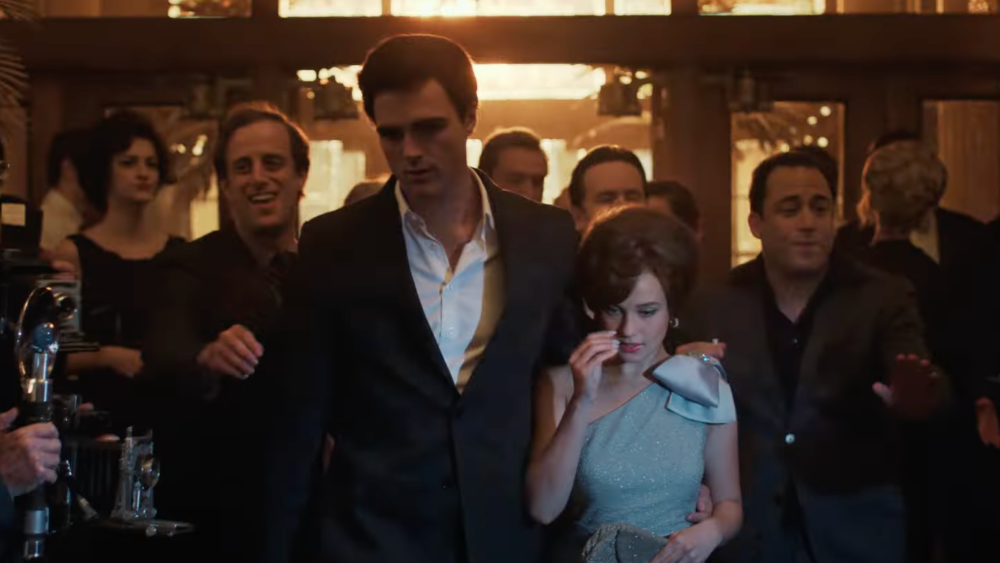
The life of Elvis Presley has been subject to countless documentaries, TV shows, books, and films. Being one of the most famous and influential musicians of all-time means that much of your life has been examined with a fine-toothed comb. It also means that those in your orbit also become famous by proximity, particularly your family, and such is the case for Priscilla Presley, Elvis’ wife. She has been a household name since she was a young woman, but less is probably known about her life despite this. Sofia Coppola’s latest film seeks to offer Priscilla’s perspective of being married to one of the most famous people to ever live.
Priscilla documents the young life of its namesake Priscilla Beaulieu (Cailee Spaeny) who meets Elvis Presley (Jacob Elordi) as a young teenager while stationed on an army base with her parents. Elvis courts Priscilla through her parents and eventually convinces the teen to move into his mansion at Graceland in Memphis, Tennessee. Elvis keeps Priscilla close while at the same time fostering his career, and image, as a rock ‘n’ roll superstar and aspiring actor, complete with the press seeking flirtations with his star coworkers. Priscilla tries to manage Elvis’ stardom, addictions, and mood swings as she grows into young adulthood.
As the story of Priscilla and Elvis’ romance unfolds onscreen, what slowly becomes clear is the process of how abusive relationships are formed and sustained, making this film one of the strongest cinematic depictions of emotional abuse ever put to screen. Coppola takes care in guiding the audience through each stage of a relationship that takes it from normal courting to something more sinister and controlling. From Elvis’ whirlwind romancing of a young Priscilla, telling her how special she is to him from the onset of their love affair and how unique their connection is, to moving her into his luxurious home where her every whim is taken care of, to slowly upping his control over her life from her hair and makeup to her wardrobe, and ultimately, every part of her existence. Alongside Elvis slowly making Priscilla just as dependent on abusing pills as he was, we see Priscilla lose her independence and become someone who relies upon her significant other for direction in life, becoming a shell of a person. The depiction of their relationship and how it gradually changes for the worst like a boiling pot of water rather than a raging fire is the heart of the film’s narrative and what makes it compelling.
While the film is unflinching in its portrayal of Elvis as a poor partner who brings harm and pain to Priscilla, I was struck by the fact that it also seemingly makes a subtle point about the nature of fame and its effect on the human psyche. As we are all well aware, Elvis was one of the most famous human beings to ever walk the Earth and he was as celebrated by the world as he was recognized by it. The Elvis that we see onscreen is clearly negatively affected by the attention and pressure that come with fame and copes with it through drug abuse and wielding his power over those close to him in an effort to feel control over something in his life. Coppola takes care not to use this as an excuse for his treatment of Priscilla, but to provide insight over his behavior and where it may stem from. This portion of the film calls into question just how healthy this level of fame is and whether humans are meant to experience it in the first place.
In terms of public perception, Elordi was assigned a tall task in not just portraying a legendary figure onscreen, but having said portrayal follow another depiction of the legend that was critically acclaimed and heavily awarded just one year prior. Despite the hurdles in his way, Elordi offers a quality performance as Elvis, pulling off the duality of gentleness and abusiveness needed in order to strengthen the film’s theme. He is at one minute caring and doting of Priscilla then losing his cool the next, making the point of the mental abuse present in a relationship that would make a woman stay longer than logic tells you she should. Spaeny also performs capably as Priscilla in depicting how someone winds up caught in a web of manipulation and love, hoping to please their significant other despite the fact it is nigh impossible to do so without harming oneself.
While both actors’ performances are notable, Priscilla is a film that’s clearly more about its story than the characters within it. Its portrayal of the life cycle of abuse is thorough and makes plain how these situations develop, giving a sympathetic portrayal of how victims become entangled in the web. Also notable is the work by its hair and makeup department in age progressing Cailee Spaeny as Priscilla. She begins the film as a 14 year old and ends it as a mother in her 20s and at all stages of her development, she looks accurate to the age portrayed despite the actress being in her mid-20s at the time of filming. While its message is a strong one, the film itself can feel repetitive as a whole and drag in parts. Still, it’s a decent film and watch.
Image: A24

